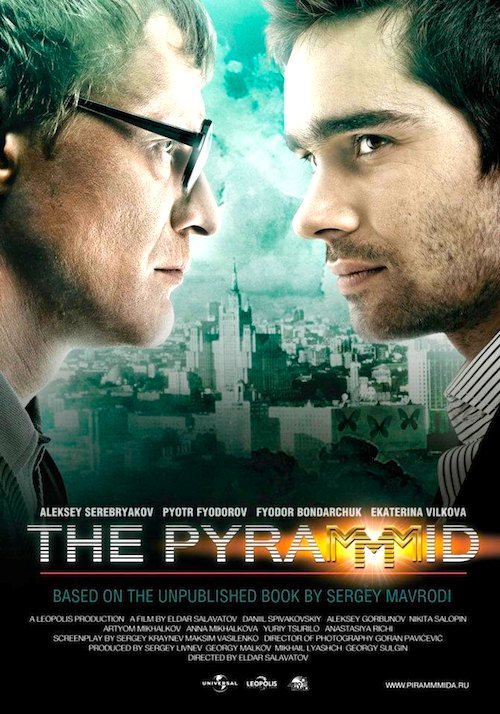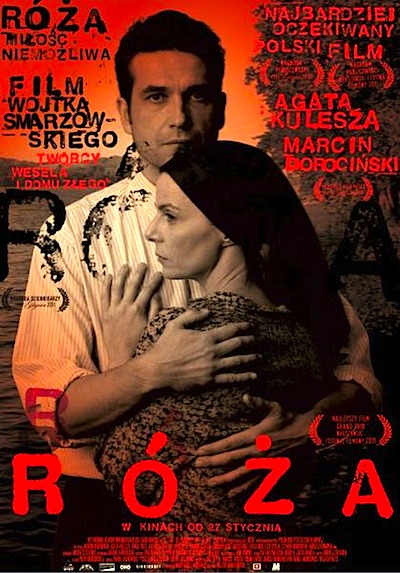By Joe Bendel. Only Russia could celebrate a Ponzi scheme con artist as a national hero. It’s a complicated place. Transparently based on Sergei Mavrodi, the Russian Madoff, a bizarre episode of post-Soviet economic history is only slightly exaggerated in Eldar Salavatov’s Pyrammmid, which screens during the 2012 Brooklyn Film Festival.
Mavrodi’s dodgy financial empire was also known as MMM and its commercials promising forty percent returns on investment were a constant presence on Russian television during its heyday. Many Russians blamed its inevitable collapse on the government thanks to conspiracy theories no doubt nurtured by Mavrodi. However, the fictional Sergey Mamontov’s MMM really is the target of the corrupt national government and their oligarchic allies. Understand: Mamontov is no mere charlatan. He is scamming all that money in order to preserve Russian ownership of the old state-owned enterprises being sold to the well-connected at fire-sale prices, through a dubious privatization process. Well, that’s Pyrammmid’s story and its sticking to it.
 It gets quite complicated, though. Raking in cash, Mamontov plans a fatal run on his major banking rival, while getting involved in weird sidelines, like buying the major Russian beauty pageant. Most of those distractions are the brainchild of maverick mathematician Anton who loses sight of the big picture. Frankly, the film is a bit overstuffed with plot, sacrificing the dead weight of transitions to fit it all in. As a result, audiences watching it in subtitles really have to keep on their toes.
It gets quite complicated, though. Raking in cash, Mamontov plans a fatal run on his major banking rival, while getting involved in weird sidelines, like buying the major Russian beauty pageant. Most of those distractions are the brainchild of maverick mathematician Anton who loses sight of the big picture. Frankly, the film is a bit overstuffed with plot, sacrificing the dead weight of transitions to fit it all in. As a result, audiences watching it in subtitles really have to keep on their toes.
Reportedly, Pyrammmid is based on an unpublished manuscript by Mavrodi, which must be considered either a novel or a memoir, depending on whether or not you happen to be Sergei Mavrodi. Ideologically, it is a bit of a head-scratcher, unambiguously lionizing exactly the sort of financial plunderer the current regime made its name inveighing against. Still, the symbolic significance of Mamontov’s choice of car is hard to miss: a vintage Soviet Chaika sedan. In fact, the film has nothing to say regarding the lack of consequences faced by the oppressive former Communist hardliners. Indeed, that refusal to account for the past has led the country precisely where it is now. The presence of Putin favorite Nikita Mikhalkov’s son Artyom and daughter Anna Mikhalkova in the ensemble cast further muddies the waters.
Having played more traditionally action-oriented protagonists in previous films (such as the Da Vinci Code-ish Golden Mean), Alexey Serebryakov is surprisingly convincing as the owlish Mamontov (those specs are another Mavrodi trademark). Unfortunately, he is largely surrounded by stock characters existing simply to serve the plot, like Gutov the shifty lawyer and Vera the ambitious muckraking photojournalist.
Frankly, the fact that this movie exists is downright mind-blowing. Imagine a slick, big budget American film positioning Bernie Madoff as a misunderstood hero, whom we should give good money to, for the sake of the country. That is about how Pyrammmid shakes out. It is a fast-moving big-canvas conspiracy thriller that does not always make a whole lot of sense. Yet, it is more stylistically grounded than the thematically related Generation P. Flawed but fascinating for Russia watchers, it screens again this Wednesday (5/6) at IndieScreen as part of this year’s Brooklyn Film Festival.
Posted on June 4th, 2012 at 9:31pm.
